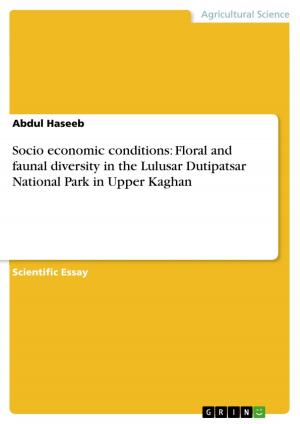China's influence in Africa
Nonfiction, Social & Cultural Studies, Political Science, International, International Relations| Author: | Adeline Defer | ISBN: | 9783638836548 |
| Publisher: | GRIN Verlag | Publication: | July 23, 2007 |
| Imprint: | GRIN Verlag | Language: | English |
| Author: | Adeline Defer |
| ISBN: | 9783638836548 |
| Publisher: | GRIN Verlag |
| Publication: | July 23, 2007 |
| Imprint: | GRIN Verlag |
| Language: | English |
Seminar paper from the year 2007 in the subject Politics - International Politics - Region: Africa, grade: 1,7, University of Münster (Institut für Politikwissenschaft), course: China and India -Two new global players, 18 entries in the bibliography, language: English, abstract: The third China-Africa Cooperation Forum held in Beijing between the 3rd and 5th November 2006 revealed the growing influence that China is becoming in Africa since a few years. This summit was announced by Chinese officials as being the most important diplomatic event ever organized in the country since 1949. The size of the African participation -48 African countries took part- was telling: Africa's leaders recognise that China is a now a hugely important economic and political player on their continent. Actually, China has had a long involvement with Africa, going back to the early days of independence movements in the 1960s and before. But the current level and intent of China's involvement is different. In those earlier days, China's engagement with Africa was politically driven: personnel, technical assistance and weapons were sent to the continent to support newly independent countries and liberation movements. Besides, during the cold war, African leaders perceived China as a leading nation of the Third World, and Maoism was sometimes used as ideological reference, while China had geopolitical interests in the continent, namely to counter its biggest ideological rival, the Soviet Union, in countries such as Angola and Congo. But in the 1980s, China's influence and involvement in the African continent waned. China was unable to compete with western aid programs, and Africa had lost its strategic importance for Chinese officials. However, this situation dramatically changed in the last decade. China's policy towards Africa during this period has its roots in the crisis surrounding the Tiananmen massacre and the persistent Western criticism of China's human rights record. These events indeed provided the initial trigger which compelled the Chinese government to seek closer ties to non-Western countries, and especially with Africa. In addition, the emergence of the international hegemony of the United States in the post-1989 period led China to steer a more active foreign policy. As a consequence, Chinese officials advanced the concept of multipolarity, and reached out to non-Western states to bolster China's international position vis-à-vis the United States and particularly its room for manoeuvre within the United Nations and other international bodies. Furthermore, since China's economic boom and its growing thirst for raw materials, the commercial perspectives represented by the African continent and its potential in energetic resources are also in the heart of the new Chinese strategy in Africa. However, China's growing influence in Africa has raised a range of interrogations about its objectives and methods. A crucial question I will try to answer is whether China's growing involvement in Africa is a positive or a negative shift for the region. Will it help or hinder the development prospects of the continent? To answer that question, I will first review the scale of China's political and economic involvement in Africa and examine the objectives and strategies underlying Chinese foreign policy towards Africa. Then I will look at the impact that China's engagement has or may have in a near future on African countries by considering its economic and political repercussions.
Seminar paper from the year 2007 in the subject Politics - International Politics - Region: Africa, grade: 1,7, University of Münster (Institut für Politikwissenschaft), course: China and India -Two new global players, 18 entries in the bibliography, language: English, abstract: The third China-Africa Cooperation Forum held in Beijing between the 3rd and 5th November 2006 revealed the growing influence that China is becoming in Africa since a few years. This summit was announced by Chinese officials as being the most important diplomatic event ever organized in the country since 1949. The size of the African participation -48 African countries took part- was telling: Africa's leaders recognise that China is a now a hugely important economic and political player on their continent. Actually, China has had a long involvement with Africa, going back to the early days of independence movements in the 1960s and before. But the current level and intent of China's involvement is different. In those earlier days, China's engagement with Africa was politically driven: personnel, technical assistance and weapons were sent to the continent to support newly independent countries and liberation movements. Besides, during the cold war, African leaders perceived China as a leading nation of the Third World, and Maoism was sometimes used as ideological reference, while China had geopolitical interests in the continent, namely to counter its biggest ideological rival, the Soviet Union, in countries such as Angola and Congo. But in the 1980s, China's influence and involvement in the African continent waned. China was unable to compete with western aid programs, and Africa had lost its strategic importance for Chinese officials. However, this situation dramatically changed in the last decade. China's policy towards Africa during this period has its roots in the crisis surrounding the Tiananmen massacre and the persistent Western criticism of China's human rights record. These events indeed provided the initial trigger which compelled the Chinese government to seek closer ties to non-Western countries, and especially with Africa. In addition, the emergence of the international hegemony of the United States in the post-1989 period led China to steer a more active foreign policy. As a consequence, Chinese officials advanced the concept of multipolarity, and reached out to non-Western states to bolster China's international position vis-à-vis the United States and particularly its room for manoeuvre within the United Nations and other international bodies. Furthermore, since China's economic boom and its growing thirst for raw materials, the commercial perspectives represented by the African continent and its potential in energetic resources are also in the heart of the new Chinese strategy in Africa. However, China's growing influence in Africa has raised a range of interrogations about its objectives and methods. A crucial question I will try to answer is whether China's growing involvement in Africa is a positive or a negative shift for the region. Will it help or hinder the development prospects of the continent? To answer that question, I will first review the scale of China's political and economic involvement in Africa and examine the objectives and strategies underlying Chinese foreign policy towards Africa. Then I will look at the impact that China's engagement has or may have in a near future on African countries by considering its economic and political repercussions.















